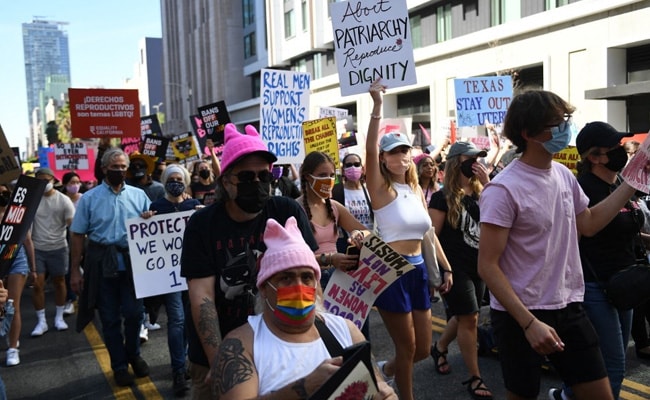“My Body, My Choice”: Protests For Abortion Rights Hits US Streets

So far this year, 19 US states have adopted 63 laws restricting access to abortions.
Washington:
Carrying signs with slogans like “my body, my choice, my right” thousands of women rallied Saturday in Washington at the start of a day of nationwide protests aimed at countering a conservative drive to restrict access to abortions.
The perennial fight over the procedure in America has become even more intense since Texas adopted a law on September 1 banning almost all abortions, unleashing a fierce counterattack in the courts and in Congress, but with few public demonstrations until now.
Two days before the US Supreme Court, which will have the final say on the contentious issue, is due to reconvene, nearly 200 organizations have called on abortion rights defenders to make their voices heard from coast to coast.
The flagship event was in the nation’s capital Washington, where a crowd of all ages — mostly women but men too — rallied under sunny skies at a square near the White House, many wearing purple masks with the words “bans off my body.”
Protesters danced to pop music blared from loudspeakers, as activists addressed the crowd in recorded interviews broadcast on large screens, and slogans like “abortion is healthcare” or “abort the Texas Taliban” were held aloft on signs, or daubed on protesters’ bodies.
A handful of counter protesters shouted “abortion is murder” but there was no violence.
Later the crowd was to march toward the Supreme Court, which nearly 50 years ago recognized the right of women to have an abortion in its landmark Roe v. Wade ruling.
Now the court, stacked by former president Donald Trump with conservative justices, seems ready to head in the opposite direction.
“Women are humans, we are full humans, and we need to be treated like full humans,” said Laura Bushwitz, a 66-year-old retired teacher from Florida, wearing a dress with portraits of women activists and politicians, like Michelle Obama.
“We should be able to have our own choice on what we want to do with our bodies. Period,” she said. “Hear that, SCOTUS,?” she asked, referring to the US Supreme Court.
The court has already refused to block the Texas law and has agreed to review a restrictive Mississippi law that could provide an opportunity to overturn the 1973 Roe v Wade precedent, that guaranteed the legal right to an abortion up until a fetus is viable outside the womb.
Rallies were planned in at least two conservative states’ capitals, Austin and Jackson, as well as in more than 600 cities in all 50 states. According to the organizers, nearly a quarter million people are expected to turn out across the United States.
“Together, we are joining hands to advocate for a country where abortion isn’t just legal — it’s accessible, affordable and destigmatized,” said the organizers of the Rally for Abortion Justice in a statement.
The group called on Congress to enshrine the right to abortion in federal law, to protect it from any possible reversal by the Supreme Court.
A bill to that effect was adopted a week ago in the House of Representatives, which is controlled by Democrats, but has no chance of passing the Senate where Republicans have enough votes to block it.
‘Patriarchal Desire’
In 2017, a first “Women’s March” was held the day after Trump’s inauguration, rallying millions of opponents of the Republican billionaire who had been accused of sexism.
Since then, other demonstrations have failed to turn out such huge numbers, in part due to internal divisions over accusations of anti-Semitism leveled at one of the organizers.
But that page seems to have been turned.
Saturday’s participants are a broad coalition including small feminist groups, community and local organizations as well as the giant of family planning, Planned Parenthood.
“We’re taking to the streets once again, for the first time in the (Joe) Biden era,” the statement said. “Because a change in the Oval Office hasn’t stopped the politicized, perverse, and patriarchal desire to regulate our bodies. If anything, it’s only gotten even more intense.”
That escalation has been spurred on by Trump’s appointment of three conservative justices to the Supreme Court, emboldening local conservative elected officials across to the country to embark on an anti-abortion offensive.
So far this year, 19 states have adopted 63 laws restricting access to abortions.
If the high court were to overturn Roe v. Wade, every state would be free to ban or allow abortions.
That would mean 36 million women in 26 states — nearly half of American women of reproductive age — would likely lose the legal right to an abortion, according to a Planned Parenthood report released Friday.
(Except for the headline, this story has not been edited by NDTV staff and is published from a syndicated feed.)
For all the latest world News Click Here
